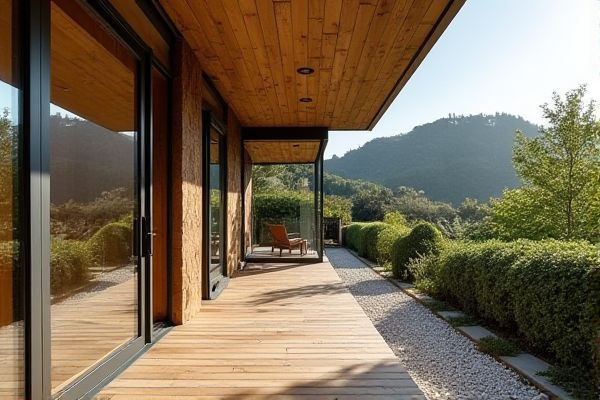
Pebble floors offer natural durability and excellent slip resistance, ideal for outdoor terraces exposed to weather, while wooden tiles provide a warm, aesthetic appeal with easier installation and versatility in design. Discover which option best suits your terrace needs by exploring the detailed comparison in the rest of the article.
Table of Comparison
| Feature | Pebble Floor | Wooden Tiles (Terrace) |
|---|---|---|
| Material | Natural pebbles embedded in mortar or resin | Wood or wood-composite tiles |
| Durability | Highly durable, weather-resistant | Moderate durability, may require treatment |
| Maintenance | Low maintenance; occasional cleaning | Periodic sealing and cleaning required |
| Slip Resistance | Excellent natural grip | Varies; may need anti-slip treatment |
| Installation | Labor-intensive, requires skilled work | Relatively easy, modular installation |
| Aesthetic Appeal | Rustic, natural look | Warm, elegant wood appearance |
| Cost | Moderate to high due to installation | Varies; generally moderate |
| Environmental Impact | Eco-friendly if sourced naturally | May involve deforestation unless recycled/composite |
| Best Use | Outdoor terraces needing durability and grip | Terraces seeking warmth and style |
Introduction to Terrace Flooring Options
Terrace flooring options include pebble floors and wooden tiles, each offering distinct aesthetic and functional benefits. Pebble floors provide natural texture and slip resistance, ideal for outdoor areas exposed to moisture. Wooden tiles, often made from durable hardwood or composite materials, deliver warmth and elegance while being easy to install and maintain on terraces.
Overview of Pebble Floors
Pebble floors consist of natural stones embedded in concrete or resin, providing a durable, slip-resistant surface ideal for terraces. Their textured finish enhances outdoor aesthetics while allowing water drainage, reducing the risk of puddles or slippery spots. Compared to wooden tiles, pebble floors require less maintenance and offer superior resilience against weathering and moisture.
Overview of Wooden Tiles
Wooden tiles for terraces offer a natural aesthetic with durability against weather elements, often made from hardwoods such as teak, cedar, or eucalyptus. These tiles provide ease of installation with interlocking systems and require regular maintenance like sealing to prevent moisture damage and fading. Compared to pebble floors, wooden tiles deliver a warmer, more uniform surface ideal for outdoor living spaces while balancing comfort and style.
Aesthetic Appeal: Pebble vs Wooden Tiles
Pebble floors offer a natural, textured aesthetic that complements outdoor terraces with a rustic, organic feel, enhancing the connection to nature. Wooden tiles provide a warm, elegant appearance with smooth, uniform patterns that mimic the look of hardwood flooring, adding sophistication to your terrace. Choosing between pebbles and wooden tiles depends on your desired aesthetic: rugged and earthy versus sleek and polished.
Durability and Weather Resistance
Pebble floors offer exceptional durability and natural resistance to harsh weather conditions, making them ideal for terraces exposed to rain, sun, and temperature fluctuations. Wooden tiles, while aesthetically pleasing, often require regular sealing and maintenance to withstand moisture and prevent warping or rotting. Choosing pebble flooring can enhance your terrace's longevity with minimal upkeep compared to the more delicate care wooden tiles demand.
Installation Process and Requirements
Pebble floors require a meticulous installation process involving a stable concrete base and precise grout application to ensure durability and slip resistance. Wooden tiles demand a moisture-resistant subfloor and proper sealing to prevent warping and extend longevity, especially in outdoor terrace environments. Your choice will influence preparation complexity and maintenance needs based on these installation requirements.
Maintenance and Cleaning Needs
Pebble floors on terraces require regular sweeping and occasional pressure washing to remove dirt and prevent moss buildup, while wooden tiles demand frequent sealing or staining to resist weather damage and maintain appearance. Pebble surfaces are more durable against stains and scratches, but wooden tiles provide a smoother, more comfortable feel underfoot with proper upkeep. Your choice will impact the time and effort needed for cleaning, with pebble floors generally needing less frequent but more intensive maintenance compared to wooden tiles.
Safety and Slip Resistance
Pebble floors provide excellent slip resistance due to their naturally textured surface, making them a safer choice for terraces exposed to moisture and outdoor elements. Wooden tiles, while aesthetically pleasing and warm underfoot, can become slippery when wet unless treated with non-slip coatings or textured finishes. Proper maintenance and surface treatment are essential for wooden tiles to enhance safety and prevent accidents on terrace flooring.
Cost Comparison and Value
Pebble flooring for terraces typically costs between $10 and $15 per square foot, offering a budget-friendly option compared to wooden tiles, which range from $15 to $30 per square foot due to higher material and installation expenses. While pebble floors provide durability and low maintenance, wooden tiles enhance aesthetic appeal and can increase property value due to their premium look and versatility. Investing in wooden tiles often yields better long-term value despite higher initial costs, making them a preferred choice for upscale terrace projects.
Sustainability and Eco-Friendliness
Pebble floors offer a highly sustainable and eco-friendly option for terraces due to their natural, non-toxic materials and minimal processing requirements, reducing environmental impact. Wooden tiles can be eco-friendly if sourced from certified sustainable forests or reclaimed wood, but they often involve more energy-intensive manufacturing and chemical treatments for durability. Choosing a pebble floor can enhance your terrace's sustainability by promoting natural permeability and longevity without relying on synthetic finishes.
 homyna.com
homyna.com